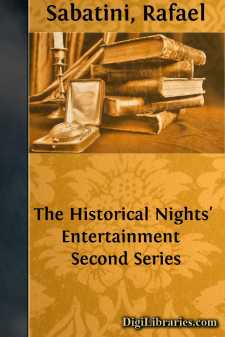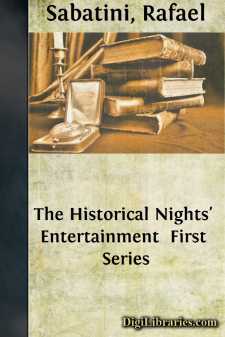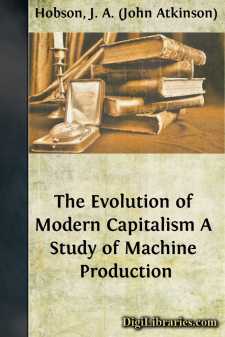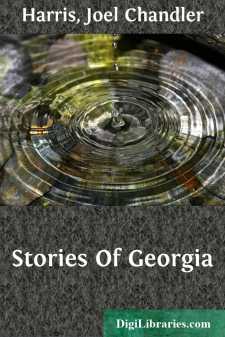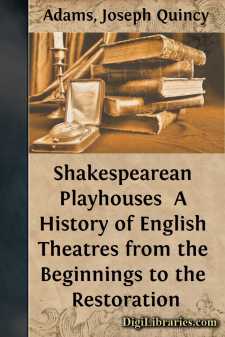History
- Africa 30
- Americas (North Central South West Indies) 50
- Ancient 68
- Asia 58
- Australia & New Zealand 8
- Canada 41
- Caribbean & West Indies 1
- Civilization 20
- Eastern Europe 12
- Europe 310
- Expeditions & Discoveries 60
- General
- Historical Geography 1
- Jewish 9
- Latin America 3
- Medieval 8
- Middle East 13
- Military 248
- Revolutionary 8
- Study & Teaching 5
- United States 353
- Western Europe 56
- World 13
General Books
Sort by:
by:
Rafael Sabatini
Preface The kindly reception accorded to the first volume of the Historical Nights Entertainment, issued in December of 1917, has encouraged me to prepare the second series here assembled. As in the case of the narratives that made up the first volume, I set out again with the same ambitious aim of adhering scrupulously in every instance to actual, recorded facts; and once again I find it desirable at...
more...
by:
Rafael Sabatini
PREFACE In approaching "The Historical Nights' Entertainment" I set myself the task of reconstructing, in the fullest possible detail and with all the colour available from surviving records, a group of more or less famous events. I would select for my purpose those which were in themselves bizarre and resulting from the interplay of human passions, and whilst relating each of these events...
more...
INTRODUCTION. § 1. Industrial Science, its Standpoint and Methods of Advance. § 2. Capital as Factor in Modern Industrial Changes. § 3. Place of Machinery in Evolution of Capitalism. § 4. The Monetary Aspect of Industry. § 5. The Literary Presentment of Organic Movement. § 1. Science is ever becoming more and more historical in the sense that it becomes more studiously anxious to show that the...
more...
by:
Harriett Bradley
INTRODUCTION The enclosure movement—the process by which the common-field system was broken down and replaced by a system of unrestricted private use—involved economic and social changes which make it one of the important subjects in English economic history. When it began, the arable fields of a community lay divided in a multitude of strips separated from each other only by borders of unplowed...
more...
INTRODUCTORY NOTE. he repulse of a British squadron, at Stonington, by a few undisciplined volunteers, having only two effective guns, imperfectly protected by a low earth-work,—and this repulse accomplished without the loss of a single life,—was not the least glorious achievement of the War of 1812-14. The fiftieth anniversary of the action is close at hand. Few who witnessed,—only three or four...
more...
PREFACE. In preparing the pages that follow, the writer has had in view the desirability of familiarizing the youth of Georgia with the salient facts of the State's history in a way that shall make the further study of that history a delight instead of a task. The ground has been gone over before by various writers, but the narratives that are here retold, and the characterizations that are here...
more...
CHAPTER I THE COURTS AND BUILDINGS S t. John's College was founded in 1511, in pursuance of the intentions of the Lady Margaret Beaufort, mother of King Henry VII. Approaching the College from the street we enter by the Great Gate. The gateway with its four towers is the best example of the characteristic Cambridge gate, and dates from the foundation of the College. It is built of red brick (the...
more...
THE SCIENCE OF HISTORY: A LECTURE DELIVERED AT THE ROYAL INSTITUTION February 5, 1864. Ladies and Gentlemen,—I have undertaken to speak to you this evening on what is called the Science of History. I fear it is a dry subject; and there seems, indeed, something incongruous in the very connection of such words as Science and History. It is as if we were to talk of the colour of sound, or the longitude...
more...
THE INN-YARDS BEFORE the building of regular playhouses the itinerant troupes of actors were accustomed, except when received into private homes, to give their performances in any place that chance provided, such as open street-squares, barns, town-halls, moot-courts, schoolhouses, churches, and—most frequently of all, perhaps—the yards of inns. These yards, especially those of carriers' inns,...
more...
by:
Sidney Lee
I I Without "the living comment and interpretation of the theatre," Shakespeare's work is, for the rank and file of mankind, "a deep well without a wheel or a windlass." It is true that the whole of the spiritual treasures which Shakespeare's dramas hoard will never be disclosed to the mere playgoer, but "a large, a very large, proportion of that indefinite all" may be...
more...


